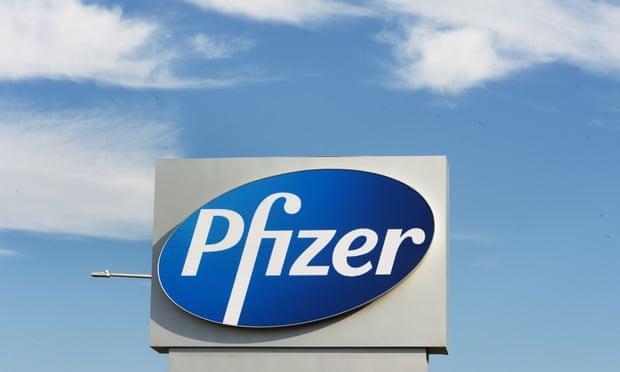Health
Pfizer Renews Commitment To Serve Patients Globally
Published
2 years agoon
By
Editor
As part of its yearly ongoing commitment to all patients globally, Pfizer is hosting its second annual global event titled, “Patients in Focus,” to recognize and underscore the influence patients have on every facet of their work.
This year’s theme “With Patients, For Patients.”, signifies a renewal of Pfizer’s ongoing commitment to serving patients.
A statement by Pfizer’s Chief Corporate Affairs Officer, Sally Susman, said: “We are made up of many local markets and differing functions, but our Purpose at Pfizer is global: to develop breakthroughs that change patients’ lives.
“For our work to be meaningful, every function of Pfizer needs to understand the importance of engaging patients, caregivers, and advocates in our work.
” By showcasing real patient experiences and where we have made an impact on patients’ lives, Patients in Focus week will continue to build empathy and show colleagues how to focus on patient advocacy year-round and in everything we do.
READ ALSO: Lagos Govt Set To Construct New Airport In Lekki
“In West Africa, we’re demonstrating our commitment to patients through an interactive panel discussion with the Country Manager and patient advocates in Oncology, Rare Diseases and Immunization to discuss ‘Promoting Health Equity As a Patient Advocate.
Patient Advocates spoke about the impact of their interventions to patients. Patient Advocates will emphasize the importance of including patients’ perspective in all facets of Pfizer’s work, and the impact of partnerships.
Olayinka Sub inair, Pfizer West Africa Country Manager said: “Pfizer’s #PatientsInFocus, is a global, week-long activation of our focus on patient centricity. This Summit is helping us to learn from our patient advocacy partners to understand how we can better incorporate patient voices into our work every day.
“Pfizer could not realize its purpose without the pivotal role played by patients, caregivers, and advocates — whether engaging in our Research & Development efforts, offering consult on our clinical trial design, or partnering with us to develop tools, resources, and easy-to-understand materials for our patients.
“This time and focus will support our work as we continue to strive to be the most patient-centric company, understanding and embedding the patient perspective in all we do.
” Further, Pfizer will be able to develop more innovative medicines and breakthroughs when we engage with patients and patient advocacy groups to understand the needs of all patients. “
“Patients in Focus spurs inspiration, energy, and innovation by showcasing examples of new ways to include patients at every step of Pfizer’s work and is an opportunity for us to collectively envision how we can continue to best serve the evolving needs of patients in the years to come.”
Michelle Akande, Vice President of Global Access Financing said “Patients in Focus allows us to highlight examples of successful patient engagement and partnerships and learn from them, demonstrating not only how Pfizer has made a difference in patients’ lives but how patient groups provide insights that guide our work.
” By sharing real patient and caregiver experiences, Patients in Focus will build empathy for and allow colleagues to better understand patient journeys and how we can work with patients to address unmet needs.
” Patients in Focus allows us to showcase bi-directional advocacy relationships and partnerships that build trust and increase awareness of the value and benefit of partnering with patients across all functions.”
Samuel Agyei Wiafe, Executive Director at Rare Disease Ghana Initiative stated: “Rare Disease Ghana Initiative in collaboration with Pfizer has been able to address gaps in the management of rare disease from increased knowledge and awareness to early diagnosis and prevention to the best-to-best practice treatment and care to community engagement to access to best treatments and comprehensive research.”
Dr. Oyinloye, Medical Director Leah Foundation commented : “The collaboration with Pfizer enabled us in closing the care gap with cancer treatment as we are able to offer consultation and assessment, counselling, awareness and sensitizations campaign through road walks, Radio Jingles in the North Central axis of Nigeria.”
READ ALSO: ASUU Reacts As FG Registers Two Varsity Unions
Chika Nwankwo, Programs Lead Vaccine Network for Disease Control said: “Vaccine Network for Disease Control and Pfizer have a long standing relationship of collaborating to address pertinent issues in sensitizing communities through edutainment. This approach of community awareness drive has since been adopted by many health outreaches and has achieved positive results in transforming community behaviors to vaccines and other health services in Nigeria.”
Patients in Focus highlights examples of successful patient engagement and advocacy and helps ensure all Pfizer employees have the knowledge and resources to incorporate patient voices into their work.
This effort, led by Global Patient Advocacy Leads across the organization, provides momentum toward Pfizer’s goals of being the most patient-centric company and improving health equity.
You may like

By Silver Yeibake
Autism, commonly known as Autism Spectrum Disorder (ASD), is a neurodevelopmental disorder that affects communication, social interaction, and behavior. Autism is referred to as a spectrum condition since it can manifest in a variety of symptoms and abilities. While the actual cause of autism is unknown, evidence suggests that genetic and environmental factors interact to influence its development.
The risk factors include a sibling with autism, advanced age of parents, exposure to certain air pollutants and pesticides before birth, extreme prematurity, mothers with diabetes, immune system disorders or obesity, any difficulty with delivery leading to deprivation of oxygen to the baby’s brain, fever during pregnancy, lack of certain vitamins minerals during pregnancy, and certain genetic conditions, such as Down, fragile X, and Rett syndromes.
“Risk factors can not on their own cause a disease. However, they can increase the likelihood of that disease in a person.”
It is important to know that contrary to trending claims online, there is no scientific or medical evidence that vaccines or consumption of sugar are risk factors for autism.
READ ALSO: Kidney Stones: What You Need To Know
Autism is defined by difficulties in social interaction and communication. Individuals with autism may struggle to grasp social cues, maintain eye contact, and engage in typical back-and-forth conversations. Some people may also engage in meaningless, repetitive actions, such as hand-flapping or rocking, and have strong interests in specific areas.
It is essential to remember that autism is a lifelong diagnosis, but with early intervention and adequate care, people with autism can live fulfilling lives.
Autism treatment frequently includes behavioral therapy, speech therapy, occupational therapy, and social skills training. Each individual with autism is unique, thus interventions should be tailored to meet their personal needs and strengths.
In spite of the difficulties that autism can cause, many people with autism possess unique talents and abilities. Some people may succeed in fields such as music, art, mathematics, or programming, thus it is important for society to acknowledge and honor the qualities and achievements of people with autism.
In summary, autism is a complicated and diverse disorder that affects individuals in various ways. By raising autism knowledge, understanding, and acceptance, we can build a more inclusive society in which people with autism can thrive and attain their full potential.
Dr. Yeibake, Weriwoyingipre Silver.
Senior Registrar,
Faculty Of Pediatrics,
WACP
Health
Don Confirms ‘Zobo’ As Antihypertensive Therapy
Published
2 months agoon
March 10, 2024By
Editor
The Deputy Vice Chancellor, University of Nigeria Enugu Campus, UNEC, Prof. Daniel Nwachukwu, after research findings and clinical trials in both animals and human, has confirmed that Hibiscus Sabdariffa, popularly called ‘zobo’ drinks, has all the curative potentials as an antihypertensive therapy.
Nwachukwu, who is a Professor of Cardiovascular Physiology in the university, stated that the antihypertensive effectiveness of the Hibiscus Sabdariffa (zobo) was comparable to those of known antihypertensive drugs that are popular in the retail pharmacies, adding that zobo’s availability, cheapness and absence of side effects make it attractive as an alternative therapeutic agent in mind to moderate hypertensive subjects.
He however cautioned that care should be applied to avoid abuse in the consumption of Hibiscus Sabdariffa (zobo), adding that the therapy could interfere with some anti-malaria drugs while its high dose was also reported to have toxic effects on the liver and kidney.
READ ALSO: How Airline Pilots Fell Asleep Mid-flight – Safety Agency Reveals
Nwachukwu’s discoveries were contained his 201st Inaugural Lecture of the University of Nigeria with the topic “The Marriage Between the Cardiovascular System and Hibiscus Sabariffa: Let no One Put Asunder,” delivered at the moot court hall, Law faculty of the University of Nigeria, Enugu campus.
The DVC warned that Hibiscus Sabariffa consumption is not recommended for persons with low blood pressure because of its well established hypotensive action, advising that during combined therapy with antihypertensive drugs, the blood pressure, BP, must be carefully monitored.
He recommended that industrialists and investors should support large scale production of Hibiscus Sabariffa beverage and its distribution to rural communities in Nigeria, particularly since the raw materials (Hibiscus Sabariffa calyx and water) are cheap and readily available.
READ ALSO: Man Stabs Two Women To Death At A Mexico Varsity
According to Nwachukwu, “This lecture is intended to draw the public attention to our research efforts and unveiling the antihypertensive ability of Hibiscus Sabariffa which is called zobo in our common parlance. What we used for our studies was the same concentration as the locally produced zobo, and we found out that it exerted significant antihypertensive ability, in some cases even higher than the antihypertensive drugs and also did combination therapy with other antihypertensive drugs.
“What is significant is that this zobo is within us, it’s very cheap and it does not have any side effects compared to other antihypertensive agents. The raw material is just to buy zobo, prepare it under hygienic conditions, boil water and put it, sieve it and drink. It may have a sour taste but we do not encourage people to add things like pineapple or sugar in order to make it sweet, because once you do that, you are diluting or reducing its antihypertensive effectiveness.
“We have demonstrated it, both in animal studies and in humans. We are the first to do clinical trials, using mild to moderate antihypertensive Nigerians and we found it very useful. Some of the results show that one can actually use it and we equally saw that you can use it to prevent even diabetes from occurring because it reduces the rise in glucose level.”
READ ALSO: Adolescent Girls Face Risks Of Sexual Violence – UNICEF
Vice Chancellor of the University, Professor Charles Igwe while summarizing the lecture said that the lecture was in three dimensions; one on health grounds, another in academics and the third an economic value.
“Its economic in the sense that we can also begin to use what God has given us to make money. Maybe because God gave us everything in abundance in this country, we don’t recognize the simplest things God gave us in our environment. Therefore, what we are saying is that we should begin to, at all these pure water productions and incorporate zobo production so as to make money out of it.
“The university has made its contribution through our laboratories and it’s now left for the business community and the industries to come and buy into it and start widening it and make it very economic,” Igwe suggested.
Vanguard

By Silver Yeibake
Hi, did you know that Tuesday 12th March, 2024 is world Glaucoma day?Kindly avail yourself of this opportunity to learn about this important health issue as presented below:
Glaucoma is a dangerous eye disorder that damages the optic nerve, causing visual impairment or permanent blindness if not treated.
The optic nerve transmits visual information from the eye to the brain. Damage to this nerve might cause gradual visual loss that is not immediately obvious.
Worldwide, this disease affects 67 million people and contributes 6.7 million of blindness in this population. Glaucoma is the leading cause of blindness in the world.
The total number of cases is expected to increase to 111 million by 2040. Males are slightly more affected than females.
One of the basic causes of glaucoma is an increase in intraocular pressure (pressure within the eyeball), which can eventually damage the optic nerve (the nerve that makes seeing possible). This increase in pressure could be caused by an accumulation of aqueous humor, the fluid that nourishes the eye.
FROM THE AUTHOR: Food Poisoning: What You Need To Know
There are several forms of glaucoma, including open-angle glaucoma, angle-closure glaucoma, normal-tension glaucoma, and secondary glaucoma, each with unique characteristics and treatment choices.
Some of the risk factors for glaucoma include sustained elevation of intraocular pressure, family history of glaucoma, race (African, Asian), short-sightedness, long-sightedness, age over 50, previous eye injury or surgery, hypertension, diabetes mellitus, migraines, and prolonged steroid therapy.
Glaucoma symptoms may not appear until the problem has advanced sufficiently, therefore regular eye checks are essential for early detection. Blurred vision, eye pain, nausea, and light halos are some of the most frequent glaucoma symptoms. However, these symptoms might be mild or readily misinterpreted as other eye problems, emphasizing the significance of regular eye examinations.
Glaucoma treatment tries to reduce intraocular pressure and protect the optic nerve from further damage. This can be accomplished using a variety of approaches, including prescription eye drops, oral medicines, laser therapy, and surgical procedures. Treatment options are determined on the kind and severity of glaucoma, as well as personal characteristics such as overall health and medical history.
To summarize, glaucoma is a serious eye disorder that requires timely diagnosis and treatment to prevent irreversible vision loss. Regular eye examinations, early detection, and commitment to treatment plans are critical for protecting vision and eye health in glaucoma patients.
Thank you.
Dr. Yeibake, Weriwoyingipre Silver, a
Senior Registrar, Faculty Of Pediatrics, West Africa College of Physician (WACP), writes from Yenagoa, Bayelsa State.

PHOTOS: FCCPC Raids Supermarkets In Port Harcourt, Seizes Underweight, Re-bagged Rice

Outrage As Kingsmen Flogged Anambra Man To Death [VIDEO]

Man Declared Wanted For Stabbing Wife To Death, Attempted Murder of Two Children
Trending

 Entertainment3 days ago
Entertainment3 days agoBridesmaids’ Dance At Wedding Causes Stir On Social Media [VIDEO/PHOTOS]

 Politics5 days ago
Politics5 days agoEdo Guber: Akoko-Edo PDP Leaders Meet In Igara, Describe Ighodalo, Ogie As ‘Perfect Match’

 Metro3 days ago
Metro3 days agoVIDEO: ‘UNN Lecturer’ Caught Pants Down With Married Student

 News1 day ago
News1 day agoDrama! Supporters Of Yahaya Bello Perform Rituals to Prevent His Arrest By EFCC [Video]

 News2 days ago
News2 days agoVIDEO: Force PRO Orders Arrest Officers Caught On Video Bashing Driver’s Car

 Headline2 days ago
Headline2 days agoDrama As Women Fight Dirty, Breasts Fall Out During Spring Break Outing In US [PHOTOS/VIDEO]

 News4 days ago
News4 days agoOutrage As Chinese Supermarket In Abuja Denies Nigerians Entry

 Entertainment2 days ago
Entertainment2 days agoNollywood Actor, Zulu Adigwe Is Dead

 News4 days ago
News4 days agoIGP, Jonathan Disagree Over State Police

 Metro2 days ago
Metro2 days agoEdo Cultists Kill Rival In Daughter’s Presence, Abandon Getaway Car
























